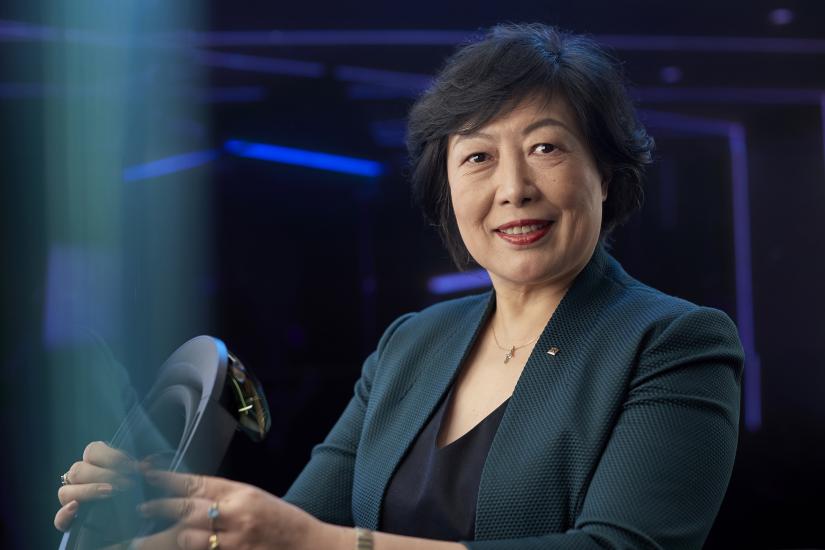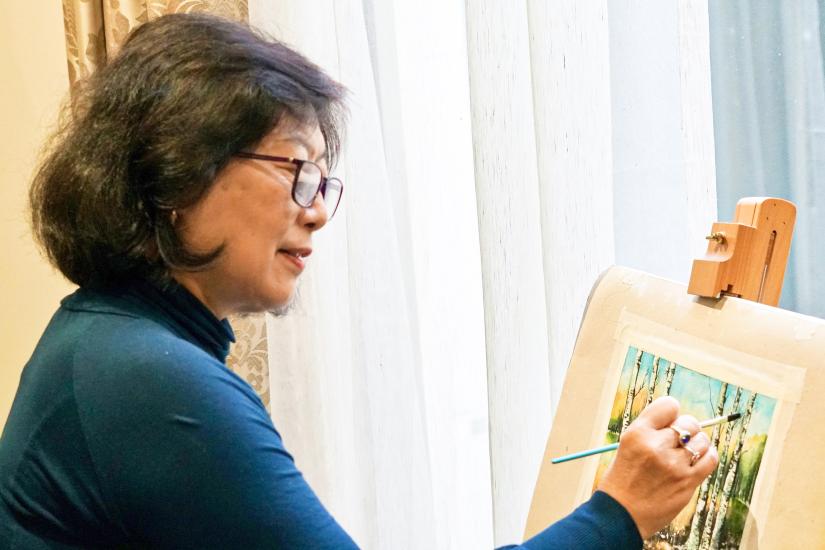The culture of research excellence in her faculty is highly prized by Distinguished Professor Jie Lu. Not only is she immensely proud of it, but she has been one of its most enthusiastic advocates in the almost two decades she has been at UTS.

‘The availability of role models is important in encouraging and helping more people to pursue research excellence’ – Distinguished Professor Jie Lu. Photo by Toby Burrows
Professor Lu is an internationally renowned scientist in the field of computational intelligence, and leads the Australian Artificial Intelligence Institute (AAII) at UTS, with 40 researchers and 230 PhD students. Her research is helping shape the way organisations use machine learning to make intelligent decisions in complex and uncertain situations.
In 2019, Professor Lu became the first UTS academic to be awarded the Australian Laureate Fellowship by the Australian Research Council (ARC). The fellowship scheme reflects the federal government’s commitment to excellence in research by supporting world-class researchers to conduct research in Australia.
Jie Lu, describe the field you work in and its significance.
My research focuses on fuzzy transfer learning, concept drift, collaborative decision support systems and recommender systems. The implications are significant for my research community as well as for society and economics.
My work has made two major contributions to important areas of AI:
- Enabling machine learning from uncertain data: real-world data is often uncertain, and not always plentiful when that is necessary for machines to learn. Real-world data is also often in streams, so its distribution changes over time in dynamic environments, which leads to the failure of classical machine-learning models. I and my team have provided scientific solutions to these two problems through developing advanced machine learning, particularly fuzzy transfer learning and drift learning algorithms.
- Enabling machine learning to generate personalised and collaborative decision-making: my research has transformed how humans can use machine-generated options and optimised objectives to support their decisions in complex environments. My research in personalised recommender systems has been patented by Google, and one of my research papers in recommender system application developments has been cited more than 1200 times.
What research are you working on at the moment? What is most interesting about it?
A digital transformation in healthcare is underway, supported by an Australian Research Council linkage project, enabling us to be more proactive. My team is working on a project with industry partner 23Strands, in which we will develop advanced transfer learning algorithms and smart recommender systems to provide next-level personalised healthcare management and decision support.
Our new personalised recommender systems will assist clinicians to make more accurate predictions of a patient’s health to prevent the onset of illness or disease. It may mean that the traditional ‘wait, then treat’ approach to our health becomes a thing of the past.
What research have you found most satisfying?
My Australian Laureate Fellowship project creates a novel research direction – autonomous machine learning for data-driven decision-making. A set of new theories, methodologies and algorithms give AI the ability to learn autonomously from massive domains of data, thereby improving data-driven decision-making in multiple industry sectors, such as Sydney Trains in real time carriage load prediction.
What is your proudest academic achievement?
I’m the first UTS academic to be awarded the Australian Laureate Fellowship. This achievement is the one I am most proud of.
Before I submitted my Laureate application, I received a lot of encouragement. The success has given me enormous confidence to pursue other exciting research and leadership opportunities.
Describe your leadership philosophy.
Excellence is the key. As the Associate Dean (Research Excellence), I drive a culture of research excellence that is high-quality, supportive, collaborative and focused on impact. The availability of role models is in my view very important in encouraging and directly or indirectly helping more people to pursue research excellence.

Jie Lu loves to paint and draw but now only gets the opportunity when she’s on annual leave.
What advice would you give to young students, especially girls?
Girls often have different thinking from boys and the ability to be more innovative in many situations. Be confident to do challenging research and provide new technologies.
And don’t forget about your communication skills – I know girls have advantages in them. With science, you need to write your results into a paper, communicate your findings. If you can't do that, your achievements will be only in your lab and on your computer.
What other interests do you pursue?
For more than 10 years, I have been the editor-in-chief of the journal Knowledge-Based Systems (ranked 16 of about 150 AI journals in the world). I spend a lot of my weekend processing submissions, and find it helpful to see the newest research findings in a broad field. The journal is an academic service to all researchers, but also a chance to promote some very active, female researchers.
The number of submissions to my journal has increased enormously in the past two years. In 2019, the year before the pandemic, I received around 3000 articles, in 2020 there were close to 4000 articles and in 2021, more than 5000. In the first four months of this year, I’ve received more than 2000.
I think an important reason is that my journal has established its high reputation in the field of artificial intelligence through the establishment of its flagship topics which lead many researchers to discover more.
I also love painting and drawing, but only get the chance to do it when I am on annual leave.
Learn more about the Australian Artificial Intelligence Institute
● Explore our research
● Partner with us
● Study with us

